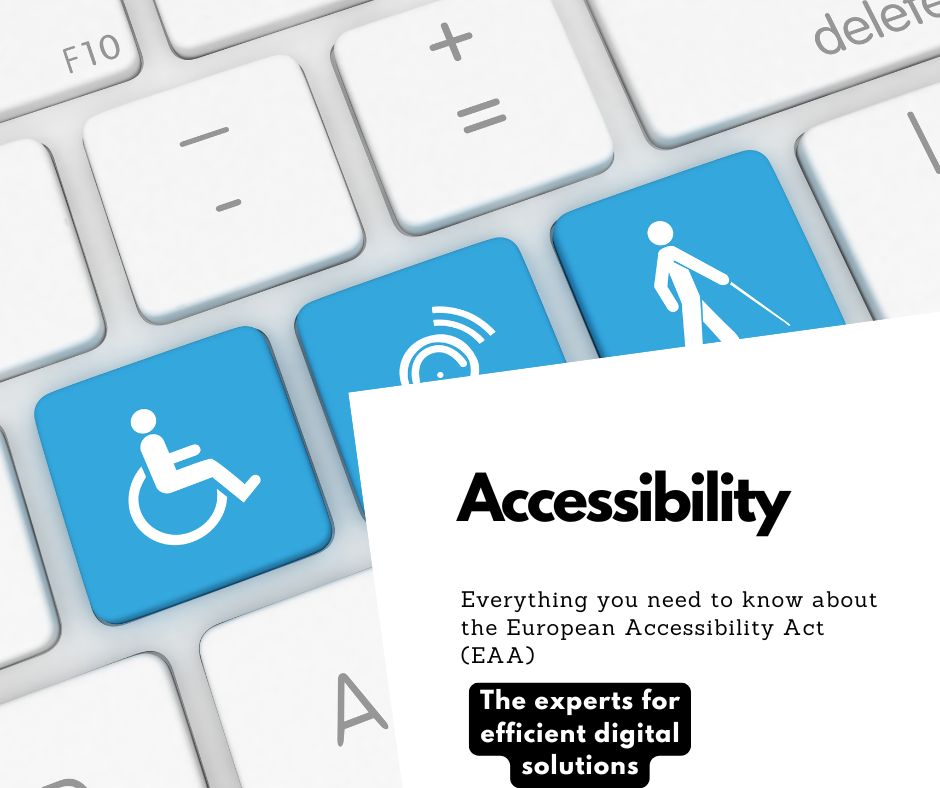Everything you need to know about the European Accessibility Act (EAA)

The European Accessibility Act (EAA) is a crucial step towards creating an inclusive society. It aims to ensure that products and services are accessible to people with disabilities and older people across the EU. With the requirements applying to private companies in less than a year, now is the time for private sector companies to take action.
This article provides you with a comprehensive overview of the obligations that the EAA entails. We also show you how we can support you in complying with the provisions of the Accessibility Improvement Act (BFSG). We also offer a free website accessibility test.
What does the European Accessibility Act (EAA) say?
The European Accessibility Act was introduced by the European Union (EU) in 2019 to improve the accessibility of products and services for people with disabilities and seniors across the EU. The EAA covers a wide range of areas, including
- Digital products: Websites, mobile apps and software applications must be designed to be accessible.
- Public services: Transportation, healthcare facilities and public authorities must be accessible to all.
- Consumer goods: Products such as ATMs, self-service machines and smart devices should be accessible.
The deadline for meeting the EAA requirements is June 28, 2025.
From this date, new products and services offered in the EU must be introduced in compliance with the law.
Around 80 million people in the EU live with some form of disability. Given the ageing population, this number is expected to rise. Many people will also experience temporary impairments in the course of their lives. Compliance with the EAA ensures that your products and services are accessible to all.


Who does the Barrier-Free Accessibility Improvement Act (BFSG) apply to?
In contrast to previous legislation, which only applied to the public sector, the European Union is extending this law to private companies that sell products or services to customers in EU member states. It applies to all companies:
- with at least 10 employees and a turnover of over 2 million euros.
- that trade in the EU.
Even companies headquartered outside the EU must comply with the EAA requirements if they want to sell goods or services in the EU.
Exceptions: Smaller companies classified as “microenterprises” and certain digital solutions that are considered disproportionately burdensome may be exempt from the requirements of the BFSG.
Does the BFSG apply to B2C (business-to-consumer)
- Applies to B2C: The BFSG applies to companies that sell products and services directly to consumers (B2C). This includes websites, mobile apps and digital services that are accessible to the general public.
- Requirements: Companies must ensure that their digital offerings are accessible and meet the requirements of the BFSG and the EAA.
Does the BFSG apply to B2B (business-to-business)
- Does not apply to B2B: The BFSG does not apply to purely commercial (B2B) offers.
- Recommendation: Although B2B applications are not subject to legal requirements, it is nevertheless advisable to consider accessibility here too in order to promote an inclusive working environment.
Does the BFSG apply to internal company applications
- Does not apply to internal applications: The BFSG does not generally apply to internal applications that are intended solely for internal use within a company. This means that applications that are not accessible to the public and are only used by employees are not subject to the same requirements.
- Recommendation: Although internal applications are not subject to legal requirements, it is nevertheless advisable to consider accessibility here too in order to promote an inclusive working environment.
Have the requirements changed compared to the BITV?
By and large, the requirements of the Barrierefreiheitsstärkungsgesetz (BFSG) and the Barrierefreie Informationstechnologie-Verordnung (BITV) are very similar. If you have already designed your website to be accessible in accordance with the WCAG criteria, you are well prepared for the requirements of the BFSG.
Enforcement and penalties for violations of the law
Companies operating in the EU – both in the public and private sector – must adapt their products and services to the EAA standards in order to avoid severe penalties. There are only a few exceptions, particularly for micro-enterprises or in cases where compliance would represent a disproportionate burden.
Enforcement and monitoring of compliance with legislation is ensured by national authorities in each EU member state. These authorities check the compliance of services, monitor the market for products and penalize infringements. Sanctions are determined at national level and include, among other things
Companies that do not comply with the regulations can be fined up to €100,000.



What regulations must be observed?
The EAA does not define specific technical standards for accessibility. Instead, it uses EN 301 549 as the adopted standard for conformance, which requires compliance with WCAG version 2.1 AA standards.
In order to comply with the EAA, providers must design products, devices, services or environments so that they can be used equally by people with disabilities. In addition, providers are required to publish accessibility information showing how they comply with the law.
Accessibility obligation: How do you deal with third-party systems?
You are responsible for the accessibility of your digital solutions, regardless of whether you have programmed a function yourself or integrated it from a third-party provider.
It is therefore advisable to look for third-party providers whose products are accessible. If there is no such provider for a specific need, document the accessibility issues in your “accessibility statement” and link to the provider’s website. Also provide an alternative, accessible version of the information. For example, you could provide a list of addresses as an alternative to a map view.
How do companies assess compliance with the regulations?
We offer a comprehensive accessibility audit for websites, digital products and services. This comprehensive assessment is carried out using the WCAG 2.1 AA criteria. Weaknesses are identified and specific recommendations for action are given in order to meet the requirements of the EAA.
The legislation comes into force on June 28, 2025, and the demand for our service is high. Therefore, please contact us promptly to ensure that your products and services are made accessible in time.


The European Accessibility Act is an important step towards an inclusive society. Companies must act now to ensure that their products and services are accessible to all people – regardless of their abilities.
Till Neitzke
What can DMG do for you?
At DMG, we have extensive experience in implementing WCAG compliance for new and existing digital solutions. Our Accessibility Auditing Service provides a comprehensive report that assesses the compliance of your digital solutions with the European Accessibility Act (EAA). The report outlines the necessary steps to ensure full compliance.
As part of our commitment to an accessible Internet, we currently offer free accessibility tests.

Successful together in the digital transformation –
Your introductory meeting with DMG
In our introductory meeting we will discuss
- what your current challenges are in digital projects
- how other companies have done it and how you can use this to your advantage.
- what needs to be done now and whether we are the right people for the job.
[ameliastepbooking]
